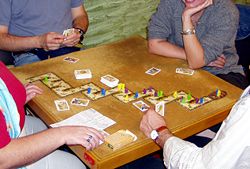Cartagena (game)
| Cartagena | |
|---|---|
 Game scene |
|
| Game data | |
| author | Leo Colovini |
| publishing company |
Venice Connection , Winning Moves , Rio Grande Games , Tilsit Editions , Identity Games , Piatnik u. a. |
| Publishing year | 2000 |
| Art | Board game |
| Teammates | 2 to 5 |
| Duration | 30 - 45 minutes |
| Age | from 8 years
|
| Awards | |
|
German Games Prize 2001: 6th place |
|
Cartagena: Escape is a game by Italian game designer Leo Colovini . The game for two to five players, ages eight and up, has very simple rules and was published by Venice Connection in 2000 . The German version, licensed by Venice Connection, was released by Winning Moves that same year .
In 2001 Cartagena was awarded a game hit - games for families of the Austrian game prize Spiel der Spiele , in the same year it was awarded the French game prize As d'Or ( As d'Or du jeu de tactique ). In 2002 it received the Dutch Games Award .
The aim of the game is to be the first to bring your six game pieces across the board into the rescue boat.
Game equipment
- 6 map tiles
- 1 boat
- 102 or 90 cards (depending on the issue)
- 30 or 25 playing figures (depending on the edition)
- 1 or no arrow card (depending on the edition)
- 1 or no assembly point (depending on the issue)
- 5 or no flags (depending on the edition)
- Rules of the game
Course of the game
The game board (depending on the output, a path through the jungle or tunnel is shown ) is first put together from six tiles, each of which has six fields with one of the six different symbols each. Since they can be combined in any order, there is a variable game board with 36 fields. Each player receives a small supply of cards in hand.
If you play a playing card from your hand, you can move any of your own pieces on the game board to the next free space with the symbol shown on the card. In particular, you skip fields on which your own or someone else's playing pieces are already, and those whose symbols are not shown on the played card. That is the tactical challenge of the game: to move at the right time and to hold your pieces together at least a little, since you can only move quickly by jumping over squares, while pieces that remain individually move forward only slowly.
You get new cards by voluntarily moving your own pawn backwards. You always move back to the next space on which there are at least one and at most two pirates. If you move back to a space on which only a pirate stands, you receive a card from your hand. If there are already two pirates there, you receive two new cards. Empty spaces and spaces with three pirates are skipped when moving backwards. More than three pirates can therefore never stand on one field.
variants
The game offers two variants in the 2000 and 2008 editions: In the luck-intensive Jamaica variant, cards in hand and draw stacks are kept face down, while in the Tortuga variant both the hand cards and the first twelve cards of the draw pile are laid out face up, which is the moment of luck minimized. In the 2013 edition, the Tortuga variant was omitted, but a simplified Jamaica variant "basic game" was added.
Versions
There are three different editions of the game in German-speaking countries, the first two from 2000 and 2008 by Winning Moves, the one from 2013 by Ravensburger. In the original edition, the pirates are represented by simple pawns , while in the later edition they were replaced by more beautifully designed pawns. In the 2013 edition, the pirates flee through a jungle instead of a tunnel, the game variants and the scope of the game material have been changed. The expenses contain three different rules for passing, which enable or prevent stalemate situations.
In 2006 "Cartagena 2: Das Piratennest" was released, whereby the path was particularly interrupted and new cards are obtained by moving the generic pieces forward, making the rules and moves more demanding without fundamentally changing the game mechanics or the atmosphere. It can also be played with the rules of the first title.
In 2008 "Cartagena 3: The Gold Island" was released, which brings with it significantly more extensive changes.
In 2011 Cartagena appeared as an app.
Web links
- Cartagena at studiogiochi (English, Italian) with instructions in several languages and links to the pages of the different versions.
- Cartagena in the Luding games database
- Cartagena in the games database BoardGameGeek (English)
- Instructions and online game in the board game world (requires Java)
- Review of the game at fairspielt.de
